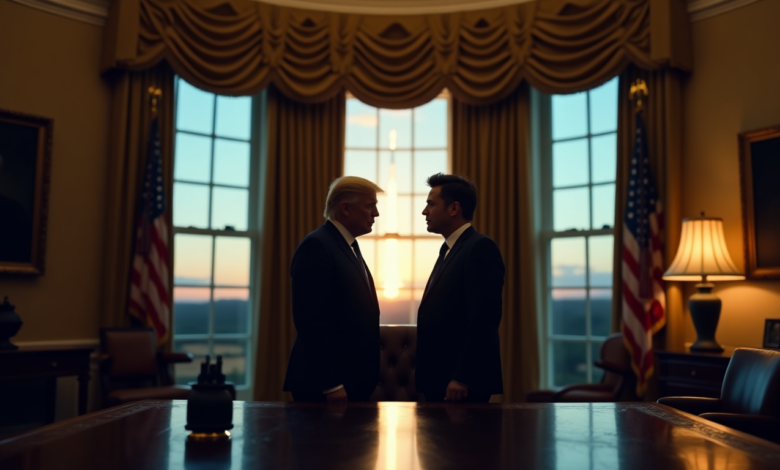
How Elon Musk is Shaping the Next Trump Administration
Elon Musk’s role in Trump’s administration hiring decisions has caught the attention of political analysts and media outlets. The Tesla CEO now influences more than just the tech world – he helps shape key administration appointments. This unexpected partnership between Musk and Trump reveals a new dynamic between Silicon Valley leaders and political decision-making.
Trump’s team takes a different approach to filling important government positions. They now welcome input from unexpected sources, including tech industry leaders like Musk. This new strategy affects everything from social security roles to senior federal positions. Musk’s input on staffing choices, his future influence on appointments, and what it all means for government leadership selection deserve a closer look.
Musk’s Increasing Influence in Trump’s Inner Circle
Elon Musk has gained unprecedented access at Mar-a-Lago, Trump’s Florida resort, which now serves as the presidential transition’s nerve center. The tech billionaire spends almost every day at the resort and takes part in high-level discussions and diplomatic communications.
His influence now extends to the most important diplomatic interactions. A recent example showed Musk present during Trump’s speaker phone conversation with Ukrainian President Volodymyr Zelensky. The Ukrainian leader specifically thanked Musk for Starlink’s communication services to Ukraine.
His financial support for the Trump campaign has been substantial, including:
- AED 160.10m direct campaign contribution
- AED 275.41m to America PAC
- AED 36.72m to the Senate Leadership Fund
Musk won’t take a formal position in the Trump administration, yet his influence remains strong through informal channels. He shares a close relationship with transition co-chair Howard Lutnick, Cantor Fitzgerald’s CEO, who manages personnel decisions. Trump appears “enamored” with Musk, and the tech entrepreneur’s suggestions about staffing decisions carry significant weight.
Their relationship has grown beyond traditional political boundaries. Musk actively uses his social media platform X to promote his political vision and suggest Trump’s cabinet candidates. His constant involvement in administration matters has made some of Trump’s transition team members uneasy.
Specific Staffing Decisions Influenced by Musk
The tech billionaire demonstrates his influence on Trump’s staffing decisions through several important endorsements and recommendations. Musk publicly endorsed Senator Rick Scott for U.S. Senate majority leader. This move matched Trump’s desire to change the chamber’s leadership. Scott, Florida’s former healthcare executive and the wealthiest sitting senator, readily accepted Trump’s demands about temporary presidential appointments.
Musk shared his thoughts about other administration positions too. He expressed concerns about Elise Stefanik’s nomination as U.S. ambassador to the United Nations on his X platform. He warned about what it means to remove her from the House, where Republicans hold a thin majority.
His influence shows through these endorsements and recommendations:
- Support for Rick Scott’s Senate leadership bid
- Strategic input on House representative positions
- Direct communication with transition co-chair Howard Lutnick
Trump once suggested Musk could become “secretary of cost-cutting” in his cabinet. The tech entrepreneur prefers to wield influence from outside rather than take formal positions. His recommendations matter because he provides substantial financial support to Republican causes and remains a regular presence in Trump’s inner circle.
Musk’s Potential Role and Benefits
Trump wants to create a government efficiency commission and Musk might play a most important role as “efficiency czar” in the next administration. This proposed commission wants to reduce federal spending and matches Musk’s outspoken criticism of government bureaucracy and regulatory oversight.
Musk’s business empire stands to gain several key advantages:
- Quick regulatory approvals for Tesla’s autonomous driving technology
- Faster safety-related approvals for Neuralink’s brain chip implants
- Greater influence over AI and space exploration policies
- Protection from Chinese EV competition through proposed tariffs
These developments have sparked positive market reactions. Tesla shares jumped more than 15% after Trump’s election victory. This stock rally added about AED 73.44 billion to Musk’s wealth, showing investors’ confidence in his stronger connections with the administration.
His role as commission head would give him substantial control over regulatory policies that affect his companies. This becomes crucial in areas where he has faced government oversight before. Musk plans to create what he calls the “Department of Government Efficiency” (DOGE) and aims to cut budgets by up to AED 7.34 trillion. Companies under Musk’s leadership could benefit from fewer regulatory requirements and lighter enforcement of federal rules.
Implications for Trump’s Second Term
Trump’s second term could revolutionize the economic landscape through sweeping policy changes that would alter multiple industries. His administration wants to overhaul international trade policies by implementing a 10% tariff on all U.S. imports and a 60% tariff on Chinese-made goods.
These economic policies would reach far and wide:
- The GDP could drop by 0.8%
- About 684,000 full-time equivalent jobs would be affected
- Consumer’s purchasing power would decrease by up to AED 286.43 billion each year
- A 25% tariff would apply to Mexican imports
The banking world expects major changes as Trump plans to bring in new leaders at key financial institutions. This includes the Consumer Financial Protection Bureau and the Office of the Comptroller of the Currency. His steadfast dedication to cutting corporate tax rates from 21% to 15% points toward deregulation and business-friendly policies.
Trump’s administration wants to remove restrictions on liquefied natural gas export permits and add more federal drilling auctions. These changes would speed up pipeline permitting and substantially alter the renewable energy sector that previous administrations built.
Trump’s proposed tariffs could create new challenges for the Federal Reserve’s monetary policy. These changes might slow global economic growth while pushing domestic inflation higher. Interest rate decisions and the dollar’s strength in international markets would feel these effects directly.







[…] Zeldin’s appointment announcement stirred strong reactions throughout the political landscape. Industry supporters and conservative leaders backed the choice and praised Zeldin’s political background that lines up with Trump’s energy agenda. Frank Maisano, a senior principal at lobbying firm Bracewell, backed Zeldin as someone “totally with the president’s agenda.” […]